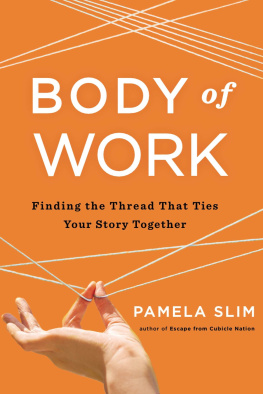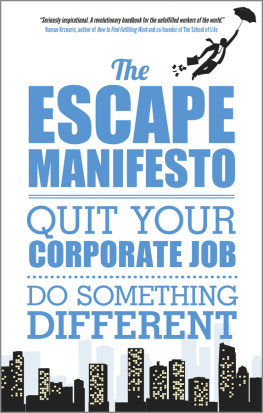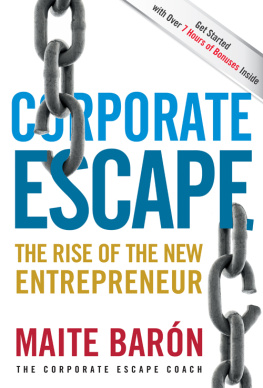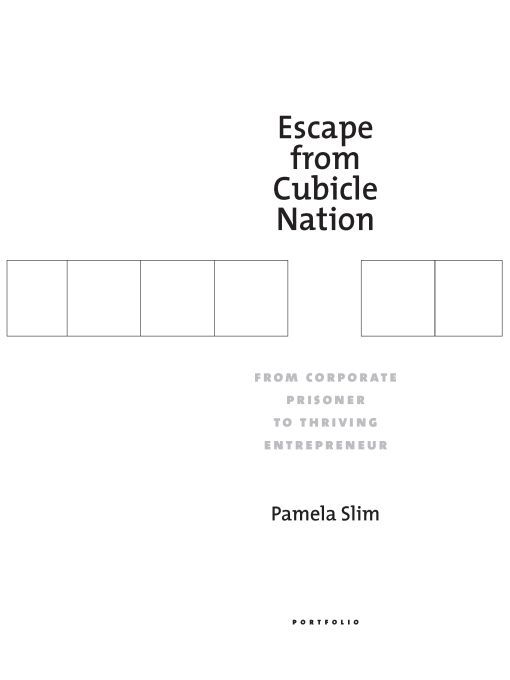Table of Contents
To Dad, who, when given a photography assignment two decades ago to take pictures of cubicles, turned to his colleague and said, Charley: twenty years from now, some expert will be discussing the detrimental effects of these things on employee mental health.
Little did you know it would be me.
FOREWORD
I have not worked for a large company for ten years. Even when I did, it was for Apple which is hardly what youd call typical. However, I know enough to tell you that is unfair to characterize all large companies as difficult places and all start-ups as Shangri-las, but for some people start-ups and small companies are the only way to go.
Clearly, you dont have to spend much time in many large companies today to see that, as Steve Jobs would say, there must be a better way. Meetings are long and painful, decision making is as much about politics as about doing whats right, and the inability to control your destiny is enough to make most people walk around with their teeth on edge.
And thats a well-run large company.
Many people go nuts in these environments and fantasize about getting out. If youre one of these people, youve come to the right place. However, the mystique of entrepreneurship is more sexy than the reality. No one wants to hear about how hard it is to finish a product, make a sale, or collect the money. Everyone wants to think they are joining the next Google, and the German and Italian cars are a few months away.
Pamela Slim is not afraid to tackle the thorny parts of the journey from employee to entrepreneur. Her pragmatism will calm your nerves, and her sense of humor will help you keep moving through the tough parts. She has spent a decade inside numerous corporations and knows the fears you currently face. Shes also been an entrepreneur and knows the challenges you will face.
No book can promise you your business will be a success if you follow a set of instructions. If it did, it would cost a lot more. However, Escape from Cubicle Nation will help you make a good decision about whether to shut up and suck up your current cubicle or strike out on your own. Think of it as a good, hard reality check.
Guy Kawasaki
INTRODUCTION
So much of the advertising and marketing about entrepreneurship, especially on the Internet, contains exuberant exclamations like:
Here is a picture of me cavorting with supermodels in the French Riviera in my ten-million-dollar yacht! or
I was an oppressed file clerk, bossed around by tyrannical managers until I spent $399 on a 12-CD training program. Now in just two short weeks I have one assistant just to paint my toes, and my former manager just called, begging to come to work for me! or
Here is my large car, parked in front of my large house with my large boat in the garage. None are as large as my bank account, which just keeps filling up, despite the fact that I only work three hours a week.
Am I the only one who grimaces at this picture of entrepreneurship?
If I were to inject reality into this image based on the last twelve years I have worked for myself, my commercial would be more like this:
Here is a picture of me at five a.m. at the Southwest terminal at the airport, pregnant and nauseated, throwing up on the curb as I prepare to fly to my clients office or
Here I am at three a.m. at the copy store, on my seventh sugar/ caffeine roller coaster of the evening, near weeping as I try to get my Word document to print out as it did on my home computer so that I can finish my materials for tomorrow mornings meeting or
Here I am trying to close a big deal with a senior executive, scared as hell but trying not to show it, and hoping that the spinach salad I had for lunch is not stuck to my teeth.
You see, although I think it is a tremendous idea to work for yourself and live a life of happiness and financial success, I dont believe that it is possible to become an overnight sensation with a few magic techniques or systems.
Finding work you are passionate about takes time. Building up the knowledge, skill, and experience to be truly great at this work is a labor of intense love and sweat. Creating a business out of this work and building infrastructure, customers, fans, advocates, and mentors requires patience.
And despite what a lot of hyped-up marketing material will tell you, hating your job intensely is not a business plan.
I spent a decade traveling all over the United States and Europe working with large corporations to improve their organizations. While I thoroughly enjoyed my work, I found a very surprising thing: some of the smartest and most successful employees inside these companies, often touted as the best place to work, were harboring secret visions of breaking out to start their own business.
They would pull me aside after an offsite meeting or corporate training and whisper, I would love to work for myself, but have no idea how to get started. How did you do it?
What puzzled me about their questions is that there is a tremendous amount of information available in books and on the Internet about starting a business (77,000,000 links in Google when I last checked). So despite lots of information, corporate employees were not getting what they needed to feel comfortable making a change.
In 2005, I started a blog called Escape from Cubicle Nation with the intention of integrating information about starting a business with my experience working as a life coach helping people navigate personal change. My readership was smallI think the first month my daily visits averaged five readers, including my dad, sister, best friend, a former client, and a random person who tripped over my site while Googling for something else. But over time, the visitors increased, and I began to get a tremendous amount of questions from corporate employees all over the world.
Simultaneously, I started coaching individuals who were actually making the transition from employee to entrepreneur and got a detailed and nuanced view of what got in the way of progress. From hundreds of conversations over the years, I developed a framework and process that enabled them to make the leap successfully. And as I suspected, much of what kept them from moving forward was not lack of information, but rather self-defeating thoughts, generalized fears, and outdated notions of what it took to start a successful business in the twenty-first century.
As my blog gained popularity, I connected with some of the brightest minds in entrepreneurship like Guy Kawasaki, Seth Godin, Tim Berry, John Jantsch, and Rich and Jeff Sloan. I interviewed scores of experts on topics from personal finance to branding and learned that there is a way to structure a business that is both deeply meaningful to the entrepreneur and tremendously valuable to the market. And I witnessed a lot of hucksters and shucksters who swindled good people out of hard-earned money with fancy programs long on promise and short on results.
This book is the synthesis of thousands of these conversations over the last three years. It is my hope that it will be the answer to (real) e-mails I get every day such as this:
Ive been working in Investment Banks for almost 20 years. I have a stable job as an officer in the fixed income controller department. The problem is, I work over 14 hour days and also log into the office from home on the weekends. I feel like I have no life and never really have time for anyone. I have an opportunity to take over a pet service businesswalking dogs, boarding, and day caresomething closer to what I always really wanted to do as a veterinarian. I should have tried to go to vet school but instead went to business school years ago which was always the in thing to do. The pet service business is risky and not as stable. My mom thinks Im crazy. I wanted to see if you had any advice. Right now Im torn on what to do. Its easy to just stay where I am and not give notice. I dont even want to talk to most of my friends because theyll think Im nuts.










